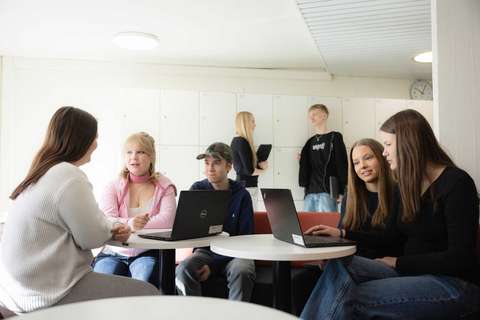Support for learning in general upper secondary school was reformed – support is available when needed

Support for learning was reformed in all general upper secondary schools in Finland. In Espoo, diverse support has always been available, but now students’ right to remedial teaching, for example, is included in the Act on General Upper Secondary Education. Transfer of information between comprehensive schools and general upper secondary schools has also become mandatory.
Support for learning is nothing new at Leppävaaran lukio, as students have always been offered many kinds of support.
“The subject teacher provides remedial teaching in their own subject, while the special education teacher provides more individual support in study techniques and learning structures, for example,” says Principal Ismo-Olav Kjäldman.
In addition, workshop activities are available, which means group-based instruction in mathematics and languages. Students can also complete unfinished study units in the Rästipaja workshop.
“Students receive support when they need it, not just if they have a diagnosed learning difficulty. One’s life situation or illness can also affect their ability to study, and they can and should receive support,” says Special Education Teacher Jesse Puhakka.
Student’s right to support
Although support has been available before, students’ right to support for learning is now officially included in the Act on General Upper Secondary Education. This gives students the right to remedial teaching whenever needed due to learning difficulties.
Principals must ensure that their school has sufficient resources to provide support. Therefore, Leppävaaran lukio has hired a new special education teacher, who will also work at another general upper secondary school in Espoo. Leppävaaran lukio is also planning to recruit a new study and careers adviser.
Students also have the right to apply for a special education decision if their need for support is greater and requires a systematic approach to addressing the obstacles to learning.
“Participation in special education does not affect the general upper secondary education syllabus or students’ eligibility for further studies. The goals are the same for everyone, but some students need more support to achieve them,” Kjäldman says.
Aiming for smoother transfer of information from comprehensive school to general upper secondary school
After the legislative amendments, a decision on learning support or special education must be submitted to the student’s general upper secondary school.
For several years now, information about decisions has been transferred within Espoo through Wilma. However, there is currently no functional technical solution for transferring student information between municipalities.
Special education teachers working in general upper secondary schools meet regularly with study and careers advisers in basic education to ensure that comprehensive schools are aware of the forms of support provided in general upper secondary schools and that staff at both levels of education are familiar with each other’s teaching methods.
All first-year students undergo Digital Reading and Spelling Screening, which is one way of mapping out special difficulties in reading and writing. Sometimes challenges may only become apparent later, because studies in general upper secondary school are more challenging than in comprehensive school.
Even if no previous information or tests indicate a need for support, students can still ask for support if they are struggling with their studies.
Special Education Teacher Jesse Puhakka is pleased to say that new students are increasingly asking about the possibility of receiving support and doing so without hesitation.
“Many of them notice that they need help with their studies in the second year, when the matriculation examination is approaching.”